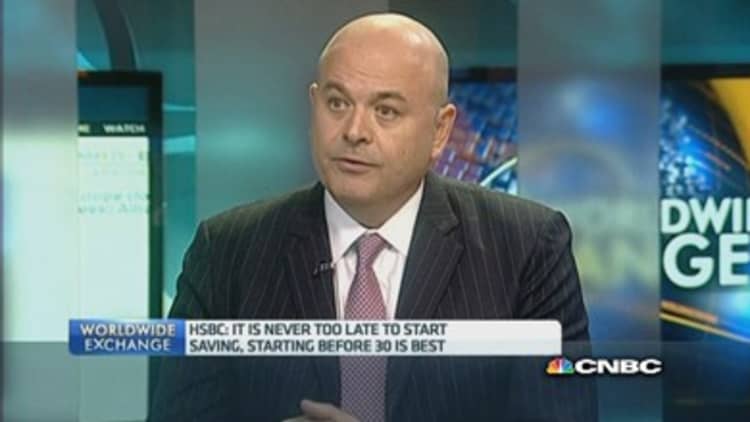
Millions of workers around the world could enter retirement with savings diminished by a fifth or more after getting into debt or financial difficulty, HSBC warned in a new report.
According to the bank, the impact of the global economic downturn could be felt for decades by the vast number of people who raided their retirement funds and accumulated debt during the financial crisis.
In a study of 16,000 people into global retirement trends, HSBC found that two in five workers stopped or reduced their savings for retirement during the downturn that began in 2007.
The situation is particularly bad in the U.K. and Canada, the bank warned, where retirement savings have been nearly halved as a result of debts or financial constraints.
"Despite the fact that close to 70 percent of people feel like they will run out of money or not have enough to live on day-to-day in retirement, 40 percent of people today are either not saving for retirement or significantly reduced their savings for retirement," Michael Schweitzer, head of sales and distribution for group wealth management at HSBC, told CNBC on Monday.
"And that is going to cause a shortfall for millions of people – as much as a fifth when they do get to retirement."
Even with a recovery in the global economy, which the International Monetary Fund expects to grow 3.8 percent this year from 3.3 percent in 2014, debt accumulated during the financial crisis will continue to weigh on workers' ability to save, HSBC said.
According to the study, this gloom is being felt across the globe, with almost a quarter of working-age people anticipating living standards in retirement to be worse than they are today.
Read MoreFor baby boomers who are ready to retire, it's 'go time'
The rising cost of living was cited as a big concern for workers in Singapore and France in particular, where around 60 percent of workers said the cost of living was rising faster than their income.
Saving for retirement has become a pressing issue for people in parts of the world such as Europe, which is grappling with an aging workforce and growing strains on public finances following the financial crisis.
"What we found is that people haven't taken the time to truly understand what they need for the future," said HSBC's Schweitzer. "For example, almost 75 percent of people in retirement have told us that they didn't realize that they had a shortfall until they were actually in retirement and that's one of the critical issues we're trying to draw attention to."
HSBC recommends four steps to improve financial well-being in retirement: start saving early, know how much you need, replenish depleted funds and plan for unexpected events.

